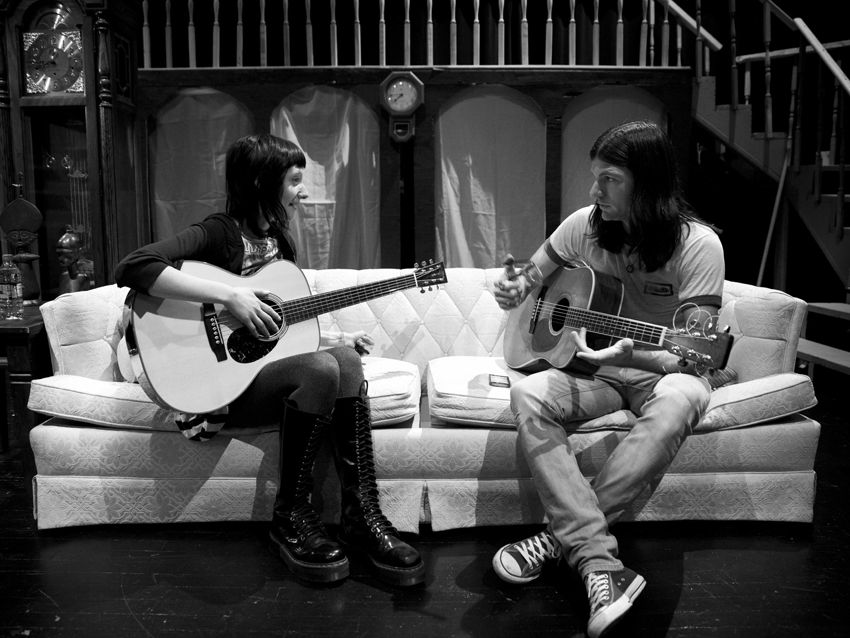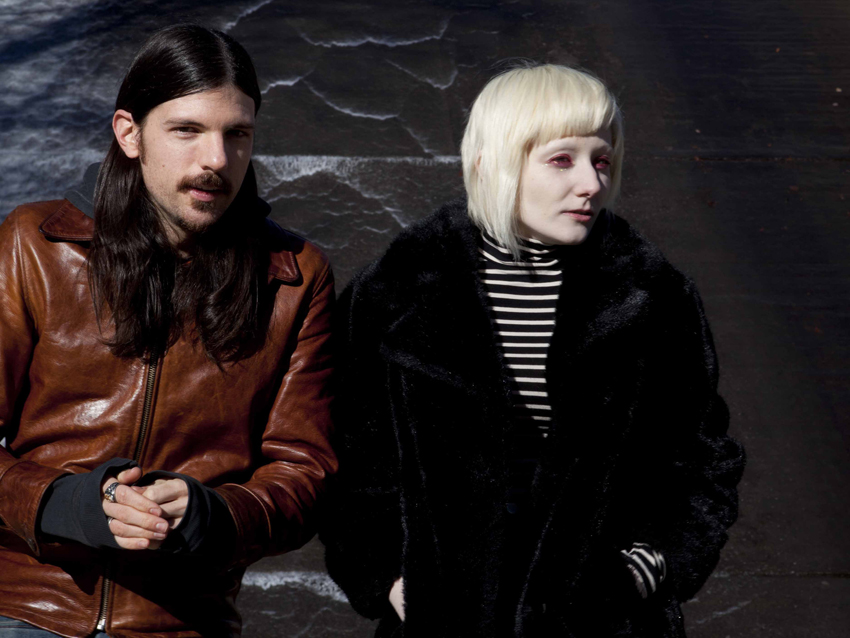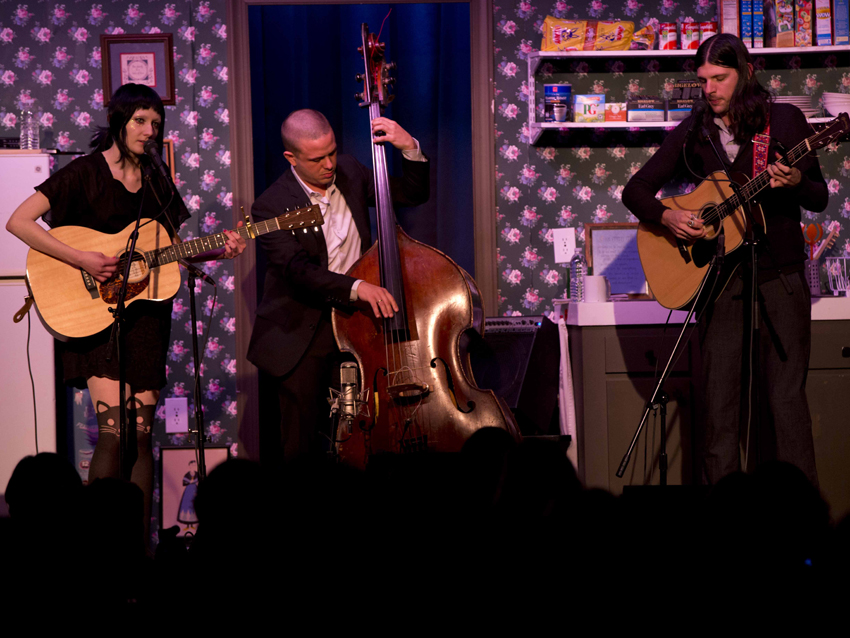
Seth Avett on covering Elliott Smith with Jessica Lea Mayfield
“His music sneaks up on you," Seth Avett says of the late Elliott Smith. "For me, it hit the heart first and the brain second. I knew I loved it straight away, but then I discovered how surprisingly complex it was. Music that works on a few different levels is always what lasts.”
Several years ago, Avett and fellow alt-country-rock star Jessica Lea Mayfield bonded over their love of Smith's music, and the two decided to take it to the next level, holing up in Echo Mountain Studios in Asheville, North Carolina, to record a dozen songs that cover the whole of Smith's career (he died in 2003, before the release of his final studio album, From A Basement On The Hill). The result is Seth Avett & Jessica Lea Mayfield Sings Elliott Smith, a luminous tribute that captures the introspective, haunting and beguiling beauty of Smith's work. Neither a reworking or a straight retelling, the album finds Avett and Mayfield mixing their voices in a mostly true duo approach, a dynamic that prevents either performer from dominating the other while allowing the material to open up in some surprising ways.
“This was a labor of love," Avett says, "but on the other hand I don’t have any interest in being a torch-bearer. I know Jessica feels the same way. We’re just trying to do music that we love, that has touched us. That was our only agenda. It’s that way, it's no different from doing our own songs.”
Avett sat down with MusicRadar the other day to talk about his relationship with Smith's music and how he went about recording with Mayfield.
How did you discover Elliott Smith's music?
“The first time I heard Elliott Smith was when I was in school, at college in North Carolina. I was close friends with a fellow named Yogi. He was learning to play guitar and he knew that I played, and he passed me a cassette with the song Say Yes on it. He wanted me to transcribe the song so he could play the chords.
“Right away when I heard it, I was struck by its beauty and honesty, the earnestness and pure sentiment. It seemed so simple to me musically, but I later found out that wasn’t the case. The melody was so good and so catchy – it just hooked me from the start. When you mix a deep meaning with a strong melody, I’m there. That’s my bread and butter. Sam Cooke, The Beatles, Stevie Wonder – those artists had it, and that’s what I discovered in Elliott Smith’s music.”
Did you share Elliott’s music with your brother Scott? Was there ever any talk of this record being an Avett Brothers album?
“It was never an idea to make it an Avett Brothers album. As far as I know, Scott is somewhat familiar with Elliott’s music, but I’m the only one out of all of us who's a superfan. The record was borne out of that, the really exciting fan conversations Jessica and I had. Out of all my friends, her love for Elliott Smith probably surpasses mine. She told me that probably 70 percent of her listening is Elliott Smith. She knows it inside and out.”
What’s your history with Jessica? How did you meet and then start talking about doing this record?
“She opened for us in Kent, Ohio, when she was 16 years old, I think. I’m roughly a decade older, so I was totally impressed with her. ‘This kid can write like that, and she’s 16?’ The songs Scott and I wrote when we were 16 were horrible. [Laughs] Believe me, they weren't good at all. Jessica’s a blue blood – she started touring when she was seven years old. I started touring when I was 21. She was fully formed as an artist. She had her whole thing together.
“We didn’t form a real friendship until four years later. Scott and her were closer from the beginning, but then Jessica and I got closer and started bonding, and of course, we discovered a shared loved of Elliott Smith.”

Playing covers
This album took a while to record – three years. Why so long? Why didn’t you go in and knock it out in a couple of weeks?
“The answer to that is pretty boring, actually. [Laughs] It came down to logistics. She’s a full-time touring musician, and I’m the same. We’ve got families and responsibilities, and there’s other things we want to do. From an artistic standpoint, I didn’t want to rush it. I wanted to take the time and redo things if we had to. Jessica and I have a deep respect for the material, so we took a lot of care with this. Three-day increments here and there were a good thing. If you don’t have a label pushing you, you shouldn’t rush things.
“Some records, sure, go the punk route and knock it out. But there’s so much breadth and quiet and calm to this music, a hopeful spirit, so it just said, ‘Take your time. Screw the schedule.’”
Even though you didn’t think of this as an Avett Brothers record, they're all on the tracks – everybody but Bob Crawford.
“Yeah, yeah. Speaking of Bob, that’s a busy man. You don’t ask Bob to take his two days off to drive to Concord. But yeah, everybody’s on there. We’ve got Tania [Elizabeth, violinist], Paul [Defiglia, bassist] and Joe [Kwan, cellist]. I felt like a few of the songs really needed string arrangements, so it was great to get those guys on it. We got ‘em all but Bob.”
It’s interesting that Say Yes was the first Elliot Smith song that hit you, because you didn’t cover it on the album.
“That’s funny, isn’t it? And Jessica’s first big song of his was Clementine, and we don’t do that either. I don’t know why it happened that way. We’re really in love with the music he did late in his life, the super-layered, multi-complex instrumentation. A lot of our attention went to that; the rest was working our way back. Who knows? Maybe we’ll do those ones at some point.”
I love the way you reworked Roman Candle. It almost sounds like an early Pixies song.
“It’s weird. I believe it’s a separate endeavor to reinterpret art. It's not like doing one of your own songs. If a cover is working, it’s because you walked right into the crossroads of your sentimentality and approach and what the original artist intended. Sometimes it happens with a similar aesthetic, and other times it’s because you have a radically different approach. We also did Ballad Of A Big Nothing, and we did it with a full-on band just like he did, and it just wasn’t happening. So we just broke it all down, and then it worked. It’s a song-by-song case.
“One thing I’ve learned from working with Rick Rubin, getting to know him and becoming friends, is that you never know what might work and what might not work. Sure, you have your inclinations, but there are no guarantees. You have to follow through with experiments to see where they might go. Roman Candle was an example of trying something radical – it was a sort of Weezer-like approach – and it came together.”

On Elliott Smith, guitarist
Above photo: Mayfield and Avett flank bassist Paul Defiglia
You sing lead on four tracks. How did you guys decide who should take the lead on which cuts?
“For better or worse, neither Jessica nor I yearn for the spotlight. We don’t have that need to take the lead. Without being too cutesy about it, we both enjoy each other’s voice. If she sang lead, it was because I was pushing her; if I sang lead, it was because she drove me to do so. There’s a lot of converse things that happened with our musical planning. We like to switch things around. It pretty much always started with us saying, ‘I’d like to hear you sing this.’”
Guitar-wise, what did you learn about Elliott Smith by making this record?
“Oh, so many things. He’s the quintessential artist who, if you’re not considering his work from a technical perspective, you might not see what he’s really doing. You might think it’s a song with only four chords or something, but man, when you start learning them, or when you watch the YouTube videos, it’s like, ‘What have I gotten myself into?’ [Laughs]
“He’s like the king of passing chords. In a non-jazz setting, I don’t know if I’ve seen more passing chords that follow along with the vocal. It’s very misleading when you’re trying to transcribe it without any kind of visual aid. From all of his instrument playing, I’ve learned a lot of valuable things that I think I’ll use in my future work. He does things you just wouldn’t think could work, but they do.”
Finally, what’s next for the Avett Brothers? Have you started the next record?
“We have. We’re well into the process. We started in November 2014, kind of broke ground on it. We pretty much committed to the engagements we’re gonna do for the year, so we’re working on the new record. I think we’re eying an early 2016 release.
“Sonically, it’s extremely varied. The bodies of the songs have come to a point where I can see what kind of record is emerging. We’re up to our necks in it. I think it’s becoming the record it wants to be, as opposed to something we’re forcing it to be.”
Seth Avett & Jessica Lea Mayfield Sing Elliott Smith can be ordered at Amazon and on iTunes. For tour dates and tickets, visit sethandjessicasing.com.
Joe is a freelance journalist who has, over the past few decades, interviewed hundreds of guitarists for Guitar World, Guitar Player, MusicRadar and Classic Rock. He is also a former editor of Guitar World, contributing writer for Guitar Aficionado and VP of A&R for Island Records. He’s an enthusiastic guitarist, but he’s nowhere near the likes of the people he interviews. Surprisingly, his skills are more suited to the drums. If you need a drummer for your Beatles tribute band, look him up.
